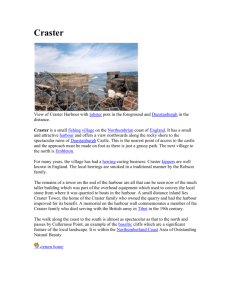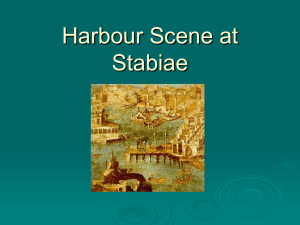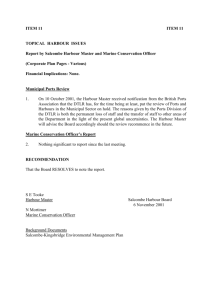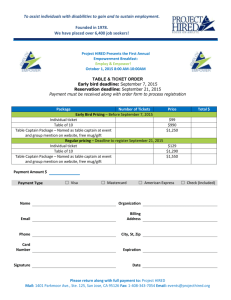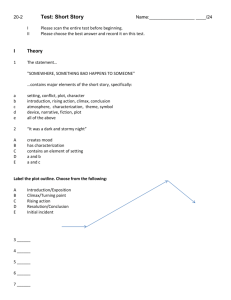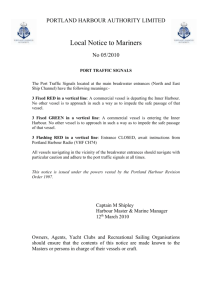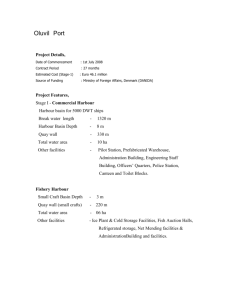Are Passenger Ships Getting Too Big, Apr `99
advertisement
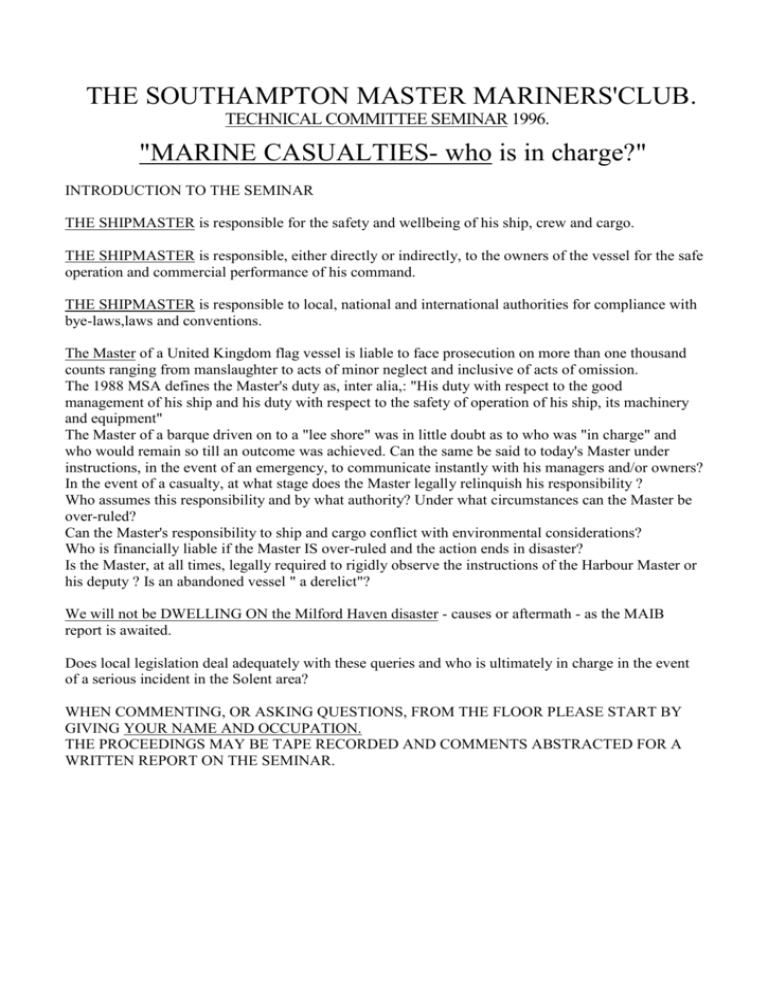
THE SOUTHAMPTON MASTER MARINERS'CLUB. TECHNICAL COMMITTEE SEMINAR 1996. "MARINE CASUALTIES- who is in charge?" INTRODUCTION TO THE SEMINAR THE SHIPMASTER is responsible for the safety and wellbeing of his ship, crew and cargo. THE SHIPMASTER is responsible, either directly or indirectly, to the owners of the vessel for the safe operation and commercial performance of his command. THE SHIPMASTER is responsible to local, national and international authorities for compliance with bye-laws,laws and conventions. The Master of a United Kingdom flag vessel is liable to face prosecution on more than one thousand counts ranging from manslaughter to acts of minor neglect and inclusive of acts of omission. The 1988 MSA defines the Master's duty as, inter alia,: "His duty with respect to the good management of his ship and his duty with respect to the safety of operation of his ship, its machinery and equipment" The Master of a barque driven on to a "lee shore" was in little doubt as to who was "in charge" and who would remain so till an outcome was achieved. Can the same be said to today's Master under instructions, in the event of an emergency, to communicate instantly with his managers and/or owners? In the event of a casualty, at what stage does the Master legally relinquish his responsibility ? Who assumes this responsibility and by what authority? Under what circumstances can the Master be over-ruled? Can the Master's responsibility to ship and cargo conflict with environmental considerations? Who is financially liable if the Master IS over-ruled and the action ends in disaster? Is the Master, at all times, legally required to rigidly observe the instructions of the Harbour Master or his deputy ? Is an abandoned vessel " a derelict"? We will not be DWELLING ON the Milford Haven disaster - causes or aftermath - as the MAIB report is awaited. Does local legislation deal adequately with these queries and who is ultimately in charge in the event of a serious incident in the Solent area? WHEN COMMENTING, OR ASKING QUESTIONS, FROM THE FLOOR PLEASE START BY GIVING YOUR NAME AND OCCUPATION. THE PROCEEDINGS MAY BE TAPE RECORDED AND COMMENTS ABSTRACTED FOR A WRITTEN REPORT ON THE SEMINAR. THE SOUTHAMPTON MASTER MARINERS'CLUB TECHNICAL COMMITTEE SEMINAR The annual seminar hosted by the Technical Committee of the Southampton Master Mariners' Club was held in the Clubroom on Wednesday, May 8th.1996 at 6.30 pm. The topic was "MARINE DISASTERS - WHO IS IN CHARGE". The stranding of the "SEA EMPRESS" off Milford Haven and the resulting oil spill served, yet again, to exercise maritime minds on the consequences of marine accidents - particularly those involving laden tankers. It was hoped, however, that the seminar would not deal with this incident in isolation and that the wider issues would be considered. These might include : At what stage does the Master cease to have responsibility for ship, crew and cargo? Who relieves the Master of his responsibility? What are the responsibilities of the Harbour Master? Who co-ordinates the salvage operation? Who co-ordinates action to prevent pollution and clean-up? The panel comprised: Captain Roy Shaw, JP LL.M, Course Manager & Senior Lecturer at Warsash Maritime Centre. Roy joined Warsash in 1981 after 25 years seafaring with British Petroleum and holds a Masters Degree in Maritime Law. Commander John Eldridqe, MBE, MRIN, MNI, MIMgt, Royal Navy. John now runs his own business - ELDRIDGE CONSULTING - "working for safer seas and a cleaner planet". It was hoped that Captain John Noble, Chairman of Murray Fenton & Associates, would also participate but, unfortunately, John was in Norway (in connection with SEA EMPRESS); his contributory paper is attached to this report. Chairman of the Technical Committee, Captain Reg Kelso, MBE FNI, welcomed the large attendance and said that we would not be dwelling upon the "Sea Empress" incident; representatives of the Marine Accident Investigation Board and of the Marine Safety Agency were present and as their findings were pending it would be inappropriate to discuss this incident in specific detail. CAPTAIN SHAW opened by saying that the law of salvage was developed in much simpler times than those we live in today. In the UK the Marine Salvage and Pollution Act 1995,which came into force in 1995,effectively changed the law and unilaterally introduced the 1989 London Salvage Convention into UK law. This comes into force, internationally, in July of this year. Although this convention covers, inter alia, environmental protection and the duties of those engaged in a salvage operation it remains silent about who is in charge of a salvage operation. Tonight we are talking about salvage where massive pollution is a possibility and not merely about the salvage of property. The old Admiralty Law approach to the question as to who is in charge of a salvage operation was that "the person in possession and control of the property has the right, in law, to control the salvage operation" In the particular case of "AMOCO CADIZ" where vital hours were lost by the Master telephoning his owners in New York we might ask "who WAS in possession and control?" Probably, New York. The pollution problem is not just one of size but also about perception in the media and in the minds of the general public. How real is this problem? In the case of the "BRAER" nature effectively cleared the problem and today's papers tell us things are going well in Milford Haven but, we cannot minimise the problem so who should take charge and what should be their purpose? Money is not the problem and funds are available. We are not asking who will pay in the long term but rather who is in charge. Should, perhaps, the Shipowner be in charge? The majority of shipowners lack the necessary expertise and skills. In many cases the Master is the most inappropriate person to be in charge even if he is still "in possession and control of the property" In the recent incident there were times when the Master was not on board so he was not "in possession" at those times. So, should the person in charge be a person who IS an expert in dealing with these problems? Recently we have seen involvement by persons obviously lacking in such expertise. Should it be The State through an Agency? The Secretary of State has powers to intervene where there is the likelihood of serious pollution. But where will the State find the expertise? Experience and practical knowledge are utterly vital - book learning is not enough. Tonight, to get the answer as to who should be in charge we will need a very great deal of profound and philosophical thinking. COMMANDER ELDRIDGE attempted to identify the type of person to be in charge. What qualities might that person need? This is essentially a risk management problem and, as such, it requires great experience of the marine environment together with experience and skill in crisis management. A study of recent disasters identifies two key needs - sound leadership and access to adequate resources. Consultation with the Joint Response Centre at Milford Haven identified involvement by a large number of different authorities with different priorities. Each interest is different. This was made clear by the recent TV programme on aircraft crashes. In one the involvement of the public hampered rescue operations and in another the public effected the rescue. In commercial (shipping) circles commerce has an influence. The causes of accidents vary - the BRAER was caused by onboard equipment failure. Should we not have reservations about a large volume of oil being transported in a single engined vessel? Few ships have systems redundancy built in. What WERE the responsibilities of the various authorities in Milford Haven? The Local Authority and, presumably, under them the Harbour Authority was responsible for shore and in-port actions, the Police for crowd control. The Coast Guard is responsible for saving life although we hear that in the case of the "Sea Empress" it was the Chief Coast Guard who was in control. Sometimes there is an adjacent authority involved - perhaps speaking a different language and with different rules and laws. Earlier we identified two keys - leadership and resources. SOMEONE must be appointed to be in charge but ..who will pay for him? Is it a national requirement or an IMO led one? The UNESCO initiative APEL (Awareness and Preparedness for Emergencies at Local Level) takes account of the impact of such incidents. Who lays down the terms of reference and who trains him? Where - under normal circumstances will he be located - and will there be more than one stationed at strategic places where risk is greatest? The person in charge must be fully accepted by all, have adequate communication facilities and have access to the necessary assets needed to deal with the crisis. But, who will pay for these facilities ?. Commercial pressure, at the onset, must be set aside from the aim of minimising the damage and the issue left to progressive and/or eventual arbitration. The person in charge must be unfettered to engage the equipment he needs when he needs it without squandering vital time. He must take charge at an early stage and have good PR skills. So, who will we choose to be in charge. Probably, the key skill is crisis management even to the detriment of marine experience. Ideally he will be well known to the industry and to others. He must be a good communicator and stamp his authority at an early stage Above all, there must be ONE PERSON IN CHARGE although he will certainly be served and supported by a team of experts. Inviting questions from the floor the Chairman asked those doing so to identify themselves by name and interest. Captain Les Morris, Associate Director of London Offshore Consultants told of his experiences in India during the salvage of a bulk carrier culminating in wreck removal. The highly effective and efficient Indian Coast Guard organisation, based on the best aspects of the USCG, have total authority and, virtually unlimited and immediate access to equipment. They take charge in a military fashion and everything is made available to the salvors. Is there room in our (European) society for a very strong Government-backed authority to provide back-up to a fully trained commercial salvage operator reporting to the relevant Government? Capt.Shaw said that this was unlikely to happen in the UK as we lack the philosophy to act in this way and the present Government would certainly not meet the funding. The UK Coast Guard differs greatly from the American model. He agreed with the concept but cannot see it happening here. Donaldson's recommendations post "BRAER" about a tug for the Western Approaches has not been met. Commander Eldridge commented that there is a cultural problem. Over the last decade privatisation has been in the ascendancy and market forces have tended to prevail. Recent disasters highlighted potential gaps in responsibility which require a policy change. Captain Jimmy Chestnutt, Deputy Port Manager & Harbour Master for the Port of Southampton said it is vital to differentiate between who wants to be in charge and who is actually responsible. Everyone wants to be in charge but not everyone is prepared to take the responsibility or pay for the operation and its consequences. Commercial pressures are a factor in the decision making process but they are not over-riding. If a Harbour Authority does not take action to protect the public its commercial interests will suffer. Following recent events ABP has thought long and hard about responsibility and involvement. It is easy to say, "I am in charge", but much more difficult to say, "I will bear the costs of my actions (and the responsibility of those events) irrespective of the outcome!” For example, what happens when the salvor says he is taking possession of the casualty? Will the salvor bear (is he required by law to bear?) the cost of his actions on the Port as a whole. The chain of command (for want of a better description) is defined in law. The Harbour Master is responsible for his harbour area and his directives have to be a mixture of balance (give and take) In the event of a disaster in the harbour area and if the Harbour Master makes a decision which is subsequently judged to be bad his employers can be liable for the consequences of that decision. But what if the Harbour Master approves the actions of the salvors; does he assume increased responsibility and is he liable for anything further that goes wrong? A Harbour Master can, in certain circumstances, over-rule the Master of the vessel and the Secretary of State can intervene and over-rule the Harbour Master. If the Secretary of State elects not to intervene but merely observe and subsequently the Harbour Master gets it wrong where does the Harbour Master stand in terms of liability? Captain Shaw said it was important to differentiate between criminal liability and civil liability. Say you do not have the funds to pay todays massive civil liability claims - who pays? Captain Chestnutt said that as Harbour Master he was probably liable under the Act but Captain Shaw suggested that he meant "accountable" rather than "liable". Captain Chestnutt said that his employers most certainly had a liability. Captain Shaw agreed that the law was far from clear and the correctness or otherwise of most actions could only be evaluated after the accident had been investigated. He stressed that in the event of an incident funds WERE available to get on with the clean-up work without delay. They will not pay for Captain Chestnutt's "negligence" and the degree of this will be decided by the Courts. Captain Peter Booth, Royal Navy, Queen's Harbour Master, Portsmouth contended that the question of negligence was clear - the Courts will decide on a Harbour Masters negligence be it in connection with oil pollution, traffic management or whatever. The key skills in the responsible person were not enough unless he had an adequate back-up organisation. Their skills were vital. Above all ..PLANNING is essential. If that is adequate 80% of the problem is solved. Commander Eldridge hoped that recent incidents would help to clarify the position of the Harbour Master insofar as any uncertainty prevailed. He agreed that organisation and planning were vital and said that every port had an organisation geared up to deal with specific emergencies. What seems to be missing is a "supremo" to make the plan run. Commander Booth suggested that the SOLFIRE plan locally dealt adequately with the areas of responsibility. Captain Chestnutt explained that in this area every authority has a responsibility and they all differ. This may be a weakness which we have to face up to. The Coastguard's is lifesaving offshore and they do this supremely well. They do not salvage vessels or put out fires. The Queens Harbour Master does not have commercial responsibility unlike the Harbour Master of other ports so his liabilities are different. To appoint an individual "in charge" is very difficult. Does the situation involve firefighting or lifesaving. Is it really a "Harbour" incident? Is there oil pollution? Other Government departments can and will intervene when their respective departments become involved. Decisions are often challenged - sometimes at a later date and without negligence being mentioned but such a challenge is liable to cost the taxpayer or the shareholder money. If that is done then the costs are something for which the Harbour Master is "responsible". Within the Harbour Area the Harbour Master is responsible ..nobody else can be unless the Secretary of State intervenes. Captain Shaw said that in harbour areas where sound contingency plans existed there was no problem. The problem arose outside those areas and that is our concern this evening. The UK is often inclined towards the "snowplough syndrome". We only have a few and accept the inconvenience on the rare occasions they might be needed. Our attitude towards disasters is similar ..insurance will pay or we will sort it out when it happens. Do we have the will to plan for occasional disasters? Commander Eldridge agreed. Plans are often targeted to deal with particular instances. There is an inherent time delay and the dawn of realisation is too slow to cope with the incident. Enabling legislation exists but the inertia in the system precludes instant response. Although emergency plans are in place every incident is different so the person in charge must be flexible. He must have a clear aim as to what he wants to achieve. A little done early can often prevent a major disaster. Captain Shaw added that in commercial shipping many actions resulting in accidents are classed as criminal offences and this fact seemed to be dominant in our minds this evening. Ashore merely because you have made a wrong decision will not necessarily make you criminally liable Captain Chestnutt said that although the Harbour Master is responsible for the management of his area he does have one main advantage, he can (provided it is justified) direct operations within that area. Under those circumstances a Master's authority is subject to directives from the Harbour Master ..there is no question about that. However, if there are flaws in the system can we suggest a better one. The Harbour Master must not be left to adjudicate between the shipmaster, salvor, shipowner etc. It would appear that the Harbour Master in Milford Haven was given advice by a plethora of people none of whom were able apparently to accept one pennyworth of financial responsibility Captain Shaw agreed but again questioned whether the will existed to set up a permanent supremo and staff. Captain Les Morris also doubted if we had the will to do it. The Harbour Master has a tremendous responsibility but when an accident happens where does he get the tugs, where does he get the oil scoops to handle thousands of tons. The response, if not national should be international. The truth is that the present system cannot cope effectively with a major disaster and we must act now if a future catastrophe is to be averted. Captain Shaw said that he could not see Government funding but funds and equipment DO exist although, perhaps, not on the scale we would like. Unfortunately the Harbour Master cannot immediately call on these so perhaps that is part of the problem. Commander Eldridge agreed it needs a National solution but over the years the resources have been reduced due to sheer commercial pressure. Until we reverse that trend (by lobbying) the problem will remain. Captain Steven Young, Deputy Harbour Master, Port of Southampton said that the Secretary of State did not appear to use his powers in the recent incident and he wondered why. Commander Eldridge said that the powers do exist but are seldom exercised. This is a common failure in many areas of Government, their set-ups are administrative not operational. Until statutory powers promote an operational response they are ineffective. Captain Stephen Taylor, Royal Navy said that although many incidents are basically similar the areas in which they occur may differ widely. Can we learn from land-based disaster relief? We once had a Government organisation called Civil Defence with supremos and under-supremos with vast powers. Commander Eldridge feared that emasculation of leadership had happened in that area as well. Courses on Civil Emergency Planning are well attended but they generally emphasise co-ordination rather than command. Councillor Payne, Portsmouth area, asked if this should not be a naval problem insofar as it was their job to defend our shores. Commander Eldridge did not immediately agree but said it was a very interesting point. Financial liability would preclude a military acceptance of responsibility and prevent them from being "in charge" in a civil situation. A forum like this must convince the Government that we have a problem of resources as a result of commercial pressure and cost cutting. Captain Chestnutt responded that he would not want this forum to think that, locally, commercial pressure would inhibit a response. Captain Young and he had, on occasions sent tugs to ships without firm assurance that they would recoup the costs. They have a clear statutory responsibility irrespective of financial loss. Captain Shaw repeated that there was a lack of political will to put funding into planning. He stressed that funding WAS available from TAVALOP, CRISTAL ETC. to meet the needs of an oil spill emergency but there is no political will to fund any of it. Captain Nigel Allen, Southampton Pilot said marine casualties did not respect national boundaries. Pilotage is international as is shipping at large so any response should be an international one. He doubted if his training was adequate to make a sound judgement on the correct actions at the early stages of a casualty involving a tanker when he and the Master would have to respond. Captain Shaw retorted that the oil industry and the safety industry had been telling us for years that native wit and intelligence were not enough when the cards were down. You need planning, training and forethought. Your authority can afford the training but, at the end of the day, will the taxpayer put his hand in his pocket...I think not. Captain Peter Stead MNI, Retired TEXACO Master said the EXXON VALDEZ disaster demonstrated very clearly the "political pressure" exerted by the media. They enjoin "somebody" to do "something now" to stop this disaster which is wiping out the environment. This puts extreme pressures on those on the spot. Our proposed Supremo will have to be a very unusual man ..a sort of maritime "Red Adair", ready to travel the world at a moments notice equipped with absolute power to muster equipment. He too feared if the taxpayer would be prepared to fund such a setup. Captain Shaw responded that he had earlier mentioned the perception of the problem (of pollution) and how "real" it was. We already hear that the Welsh beaches have been cleaned up. The media is in dire need of education. Oil is not the worst disaster in that although dirty it is not too toxic and can be cleaned up. Greater losses to fish stock occur by natural causes. Commander Eldridge said that he had contacted Milford Haven today to ask the Joint Response Cell for their views on the operation. Would nature have solved the problem eventually without their intervention? It was viewed as vital to take the right action early. In this case 3000 tons of oil was retrieved as weather allowed. The remainder dispersed largely as a result of the weather and combined efforts of all involved. Media attention certainly created a "do something now" atmosphere which always risks clouding the issue. One of the reasons the media can exert such pressure is because they are there, have good communications and are well versed in their work. So, the supremo or someone on his staff must be equally well equipped in all respects to deal with them. A sort of marine "spin doctor". Actually, in "EXXON VALDEZ" the contingency planning was largely forgotten and the lack of flexibility in response stressed the need for an international response. Captain Young said that the paymasters held the key to much of this. The P&I Clubs and underwriters would only pay for what is reasonable. Would they really fund a "Red Adair" type approach with unlimited access to equipment? Commander Eldridge commented that hopefully our supremo would know what the paymasters would fund and would plan accordingly. Captain Peter Booth, Royal Navy, said that there was no question as to who was in charge within a harbour area. IT WAS THE HARBOUR AUTHORITIES. They will have a contingency plan and they may appoint an "on scene" commander to implement it. He may be a salvor or a P&I man but there is one person in charge aboard and one person in charge ashore. If the MPCU or the Coastguard gives advice the Harbour Master will listen to them. If someone in authority over-rides the Harbour Masters decision it must be done formally, in writing. If we look outside the Harbour area the situation differs and that is where the "in charge" vacuum exists. Does the MPCU not have a plan, perhaps Government driven? Captain Shaw doubted if the MPCU or the Coastguard had the powers to take charge. Only the appropriate Secretary of State could adopt these powers; his jurisdiction can, under the Intervention Convention, extend beyond territorial limits. Captain Chestnutt reasserted that the Secretary of State (on behalf of either the Coastguard or the MPCU) was the only person who could relieve the Harbour Master of overall responsibility within the harbour limits. Captain Mike Pugsley, MOD Salvage Officer (Rtd), fully supported the contention that this was a Government problem. The DOT does not have Salvage Officers but the MOD does. The conditions exist for secondment if asked for. The MOD has some 15 Salvage Officers with considerable resources in ships and tugs ..their daily activities give them a degree of experience which is increasing and would be useful. Perhaps our "Red Adair" might come from them. Commander Eldridge agreed that there were resources "tucked away" in various ports and parts of the UK which, if brought to bear early enough under the correct leadership could be crucial to the outcome. This must be Government led and is a fair subject for lobbying the Secretary of State. Captain Shaw said the country has been overtaken by events. Up to TORREY CANYON we were able to deal with the situation but the scale of these disasters has increased so much that we now have a huge problem. Salvage has never been within the remit of the DOT. Captain Peter Marriott, Chief Inspector MAIB, wearing his DOT hat said there was a "memorandum of understanding" between the MOD Salvage Unit and the Marine Pollution Control Unit allowing advice and assistance. This was a "Donaldson" recommendation. Captain Colin Wood, a Shipping Safety Officer asked if we should not be scrutinising the US incidents. They appear to have an adequate set-up whereby the Shipmaster makes one phone call to a qualified individual who activates the appropriate Response Plan. He calls out an oil Spill Contractor funded by the shipping company who already has funds in place. He calls an On Scene Commander. In the States they are there and they work. Captain Shaw responded that the UK taxpayer would not fund this and Captain Wood said the shipowners did. Captain Shaw said that at the end of the day the consumer paid. Captain Chestnutt again drew attention to the difficult position of the harbour authority with regard to other harbour users when dealing with an incident. Other Port users might attempt to claim for disruption if, for instance, the port was closed when in their view the action by the Harbour Master was excessive. Captain Downer, Tanker Master (rtd), recalled an incident in Singapore when he was given incorrect information about tidal set and was placed under great pressure to release his third tug at a time when he was struggling to turn head to sea. Inexperienced interference could have put the vessel in jeopardy. He became the scapegoat for the incident. In Milford everyone had a say. Someone must be in charge or another disaster is inevitable. Commander Eldridge said one of the most feared lobbies in Milford Haven was the Organisation of Seaside Landladies who are not to be ignored ! Commenting on Captain Noble's submission Captain Booth said that the military authorities are as liable to litigation as anyone else - they are not protected in any way. The difference is that the losers are the taxpayers. Captain Shaw commented that not all military authorities were as answerable in this respect as our own and said that the English Law of Negligence differed from that in many countries in Europe and beyond. Captain Hamish Roberts, Shipmaster and Barrister (Rtd), said that despite the large number of people involved in an incident the Shipmaster dealt with very few. The Master of a ship is in command at sea but when he enters a harbour he falls under the jurisdiction of the Harbour Master. In the event of a casualty which needs a salvage service the Master may make an arrangement with the salvor on Lloyds Open Form or a contract. The Master and the salvors have liability "in tort". If the situation is not dealt with expeditiously the Harbour Master may intervene. Other than that only the Secretary of State can intervene. Other agencies are not contracted to the ship, so, who is in charge? It would seem that the Master is until superseded by the Harbour Master (who, in turn, may be superseded by the Secretary of State) - there is nobody else. Owners of damaged property can claim against the ship or, perhaps the MPCU if they seem to be negligent. Captain Kelso, Chairman asked Captain Chestnutt how long he was prepared to wait while the Master negotiated a deal with salvors. In other words at what stage does the Harbour Master intervene? Captain Chestnutt said there was no precise answer. The Harbour Master has a wide range of interests and activities one of which is the casualty. One possible occasion might be following a collision when the Harbour Master might, for example, see beaching as the best solution - a view not shared by the Master. The Harbour Master has to take consideration of all harbour users and act accordingly in the collective best interest. Todays shipmaster can contact his owners as quickly as he can contact the port authority and when this is done the owners often institute unilateral action to protect their "selfish" interests without regard to those of the port as a whole. There is no simple answer but there IS a point where the Harbour Master must take control. It is a question of sound judgement. Captain Les Morris recalled a relatively minor incident when a bulker carrying iron ore broke in two off her Brazilian berth. This inspired many ore loading ports to look at their own contingency planning. Commercial interests prevailed and many decided on a policy of immediate wreck removal irrespective of cost. Salvage companies are very professional and can use their expertise to great effect at the outset. The Master is seldom the man to control a post casualty situation and often his mental anguish precludes rational decision-making. Captain Hamish Roberts pointed out that that there are many serious casualties that do not require the services of a salvage company. Captain Chestnutt said it was important to look at the situation when the Master, Owners and Salvors wanted to take action which was not in the best interests of the port as a whole. That is a key issue. If, for example, the best course of action for the cargo is A, for the hull it is B and for the port (and the environment) it is C, D or E, who decides? The one man who cannot duck the issue is the Harbour Master, at least and until he is overruled by the Secretary of State. The shipmaster is responsible for his own ship, the Harbour Master is responsible for many ships within the harbour area. The salvor has his own commercial concerns. Captain Shaw warned that the current trend was for judgements to award relatively low payments to salvors. If this continued and they were not encouraged to provide their costly equipment by being given adequate reward they will not be there when needed. They are skilled and valuable and we may lose them. Captain Morris retorted that sometimes salvors claims are excessively high and that the problem of reward would resolve itself. Commander Eldridge asked what competence existed within the DOT to allow the Secretary of State to take charge - maybe we should ask this question more loudly. Danny Glustig (Full Time Student, SIHE) commented that despite the talk about the power of the Harbour Master he appeared to be constrained by pressures from commercial orgnisations. Does he not have powers to impose fines on those failing to comply with his requirements during an emergency? Captain Shaw thought it unwise to extend powers to impose fines and Commander Eldridge said the fines imposed would be minimal. The Chairman concluded the questions from the floor and invited Captain Terry Hughes, FRIN FNI, Staff Captain of the Club to sum up and thank our speakers. Captain Hughes said it was a fascinating evening conducted by two competent speakers. Captain Shaw took us through the legal web and posed the question whether ship owner, shipmaster or, indeed, the experienced salvor should be in charge. Commander Eldridge talked of the practicalities of crisis management, the need for sound leadership and resources and the problems of media attention. The floor stressed the need for a plan. From personal experience Captain Hughes supported the contention that every crisis needed a different solution. His job involves the training of VTS personnel from all over the world and sometimes there is a VTS contributory factor to accidents. Few VTS authorities view a casualty in the same way. In Scandinavia the ports are run by the towns or cities, the pilots are employed by the Government and they run the VTS. A common VTS performance standard is essential. The aviation industry is a good model of this. At the invitation of Captain Hughes all assembled thanked the speakers in the traditional manner. crk 4.7.96. The following is the written report submitted by Captain John Noble who was unable to attend. WHO’S IN-CHARGE? INTRODUCTION Over the past 15 years I have attended no less than 40 major casualties in jurisdictions from the United Kingdom to Ecuador. Many of these casualties have been high profile internationally ("AGIP ABRUZZO", "HAVEN", "BRAER", "SEA EMPRESS”.) The issue of who is in charge has varied quite considerably. There is one common feature about shipping casualties and that is the shipowner is never in charge! WHAT IS MEANT BY IN-CHARGE? During a post casualty response there are many levels of activity and each level or module of activity requires a commander. I will look at some of these below. Regarding who is in overall charge, a question is often vexed. Much of the vexation arises from the fact that very often nobody wants to be in charge. There is "in-charge" from the executive point of view; there is "in-charge" from political aspect and very rarely are the political and executive masters the same individual. There was a time when the paymaster for a response, either the Hull and Machinery underwriters and/or P&I Clubs, actually took control of an operation. For a number of reasons the emphasis has changed and the responsibility for being "in-charge" invariably now rests with some form of local or national authority. For example, in Italy during the “AGIP ABRUZZO”and “HAVEN” incidents the question of statutory responsibility depended on whether or not a Local or National emergency had been declared. The “AGIP ABRUZZO ” remained a Local emergency, but the "HAVEN" quickly became a National emergency. This meant that the Port Captain in Genoa (Admiral Alati) was in charge whilst the local emergency continued in both instances. Once the "HAVEN" had been declared a national emergency overall charge transferred to the Ministry of Civil Protection (Admiral Turbini). In Italy at that time the Port Authority system was run by the navy and the military style of chain of command ensured that executive requirements were carried out! JURISDICTION The question of who is in charge within the UK usually depends upon in whose jurisdiction an incident took place. If a casualty occurs within port limits, most harbour bylaws place executive responsibility upon the Harbour Master. In effect this means that the Harbour Master is "in-charge" and can issue directions as required. The real difficulty arises when an incident is so "big" that the National Authorities consider the capabilities of the Harbour Authority are insufficient and take over. Here lies a major problem; is there a clear procedure when this occurs? In a very complex casualty, involving pollution, loss of life or port blockage, other authorities such as police, coastguard or fire brigade may wish to take over the incident or, aspects of it. Perhaps the time is right for somebody (Department of Transport?) to take the initiative. Whether or not this will ever happen is open to question, because each port's by-laws would have to be amended to cover such an eventuality. OTHERS "IN-CHARGE" Consider an incident where a ship lies aground in a port area, threatening to harm the environment with a salvage operation under way. Who is in charge of the salvage operation? Conventional thinking would answer the question by saying quite simply that the Salvage Master is in charge of the salvage. Indeed, operation-ally that is the case. In most instances however, a Salvage Master would be required to submit his salvage plan to the statutory person "in charge". This is where it gets compli-cated; in some jurisdictions a salvage plan may have to be presented before a number of authorities before it can be given the go-ahead. All this bureaucracy invariably delays operations and sometimes, by the time the plan is approved, the parameters of the casualty have changed, thus requiring a revised salvage plan to be approved and so on! One of the most common issues addressed in these circumstances is whether or not bunkers should be removed from a casualty before salvage commences. In some areas there is an almost automatic requirement that bunkers be removed; in others there is a more pragmatic approach. Who takes responsibility if an order is given to remove bunkers from a ship and, because the order has been given, an opportunity to salve the ship is lost? Where does the Master stand in all this? Insofar any salvage operation is concerned under the Lloyds Open Form the salvage master is clearly in charge and the salvage contract can only be ended in certain defined circumstances (L.O.F. para.4). Nonetheless, if the Master and crew remain on board they have a duty to assist the salvors. I would suggest that the Master remains in charge of the ship's crew and the normal day today running of the ship. Consideration must be given to a ship master's state of mind following a casualty. After a major casualty other players appear on the scene including the owners or managers of a ship, together with an entourage of technicians and superintendents. No doubt their emergency response plans allocate responsibility to individuals, each of those being "in-charge" of a particular aspect of the response. All too often such response plans ignore statutory requirements and chain of command. Unfortunately, in many instances owners (and sometimes salvors) press ahead without appreciating fully who really is in-charge; many misunderstandings have arisen, because casualty responders have ignored the requirements of port and national authorities. There are many others who might like to think they are in-charge, or at least have some responsibility for a casualty response; this might include surveyors, chemists, lawyers, environmental groups or local politicians. Somebody once estimated that in California there were 18 different groups each with an influence over events and each exerting some degree of authority by being "in-charge" of one aspect of an incident. COMMENTARY From my own experience the best run casualties are those where there is a clear single individual in charge of events, an on scene commander of sorts. In jurisdictions where the military have a strong presence this is relatively easy because they can make decisions, and no matter how stupid they are, responsibility for the results of those decisions does not rest with them. There are far more problems in more open regimes where, if a decision is made by someone in authority, and as a result of that decision things go wrong, the individual or organisation concerned can be open to criticism and possibly legal action with attendant claims for damages. This maybe a fault, because in such circumstances no one wants to be in charge. This reluctance to take charge often results in implied or assumed authority being imposed. By this I mean circumstances when people representing statutory bodies will indicate their "preferred action" to responders, without actually invoking powers giving them the authority to impose their wish. Responders, thinking the expressed wish has some form of authority behind it, feel obliged to co-operate even if the actions suggested is not the most prudent in circumstances. In those circumstances those in authority get their wish without assuming any responsibility and those undertaking or paying for the work are left holding the baby with no redress. Every web needs a spider and the web of casualty response is no exception. Captain John M. Noble. 7th May, 1996. MARINE DISASTERS WHO IS IN CHARGE? SUMMARY AND CONCLUSIONS The seminar report was discussed by the Technical Committee of the Southampton Master Mariners' Club and the following recommendations were made: It would appear that there are ample funds available to meet COMPENSATION CLAIMS for pollution damage resulting from an escape of oil. Briefly, these comprise PRIMARY COMPENSATION provided by Tanker Owners and SUPPLEMENTARY COMPENSATION provided by Cargo Owners. PRIMARY COMPENSATION a. Tanker Owners Voluntary Agreement concerning Liability for Oil Pollution (TAVALOP). b. The Civil Liability Convention - an IMO led International Convention of limited application. SUPPLEMENTARY COMPENSATION a. Contract regarding a Supplement to Tanker Liability for Oil Pollution (CRISTAL) - a voluntary scheme. b. The International Fund Convention - an IMO led convention of limited application. The IMO Conventions were implemented to ensure an immediate response to a spill without investigating responsibility and all of the above have strict Limits of Liability (except in US waters). It has been suggested that in recent incidents there was a reluctance to accept immediate FINANCIAL RESPONSIBILITY for the costs of tug assistance to refloat the casualty (and possibly PREVENT POLLUTION) and that vital time was lost in endeavouring to achieve this with inadequate bollard pull. There may be merit in allocating some of the above funds to UNDERWRITING such initial expenditure.
